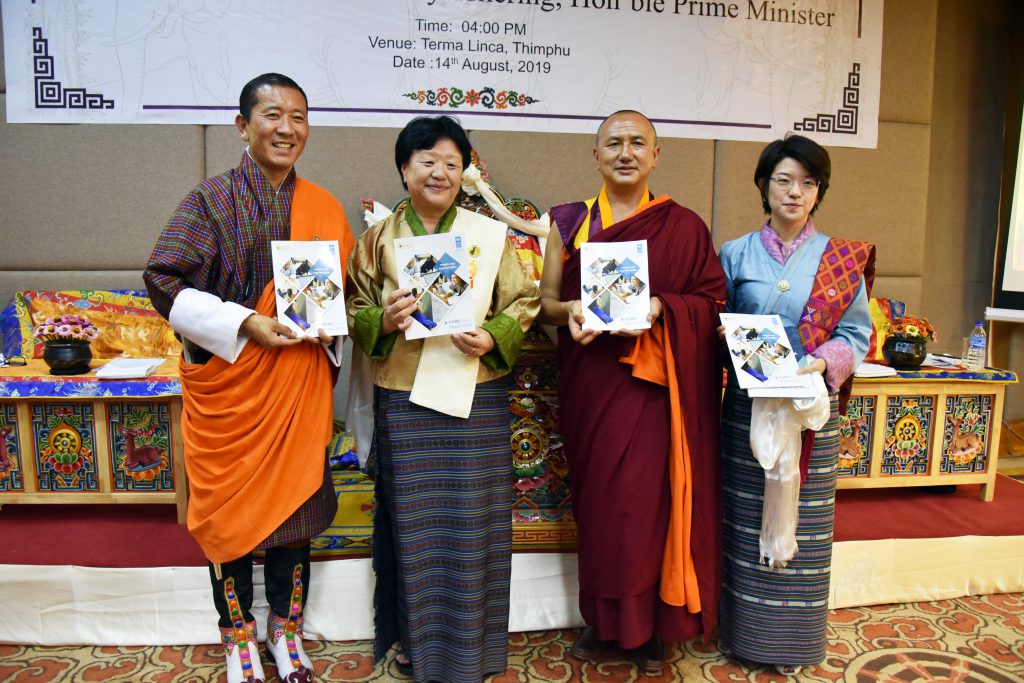In an effort to reinforce ‘DAMTSI’ as the core Bhutanese value, His Excellency Lyonchhen Dr. Lotay Tshering, Hon’ble Prime Minister launched the ‘National Integrity and Anti-Corruption Strategy (NIACS) 2019-2023’ on 14 August 2019 at Terma Linca, Thimphu. The launch was joined by His Eminence Laytshog Lopen of Zhung Dratshang (Central Monastic Body), Resident Representative of UNDP Bhutan and Chairperson of the Anti-Corruption Commission.
The launch was attended by 175 dignitaries from the three arms of the Government (Executive, Judiciary & Legislative), Zhung Dratshang, Constitutional Bodies, Ministries, Autonomous Agencies, Diplomatic Missions, Development Partners, Local Government, School and Tertiary Institutions, Corporations, Civil Society Organization, Media, Private Sector and Youth Group.
The launch marks yet another milestone for Bhutan, in particular, the Government and Anti-Corruption Commission thereby reinvigorating the policy on ‘zero tolerance to corruption’. Hon’ble Prime Minister highlighted that irrespective of its size and shape, the Government upholds absolute zero tolerance to corruption. Hon’ble Prime Minister stressed that in fighting corruption it is imperative for all to take equal responsibility and act as a “mini-ACC”.
Corruption in other parts of the world has created havoc and distressed governance systems leading to social injustice and disharmony. However, Bhutan has always been blessed with His Majesty’s benevolent and far-sighted leadership. Fighting corruption has constantly received utmost consideration. The Constitution of the Kingdom of Bhutan confers duty to acknowledge corruption as an evil and empowers the people to play a part in this noble effort to uphold justice and act against corruption.
Fighting corruption in Bhutan is more of anticipatory than response to crisis. As Bhutan graduates to lower Middle Income Country by 2023, it is imperative that the corruption be controlled. The resilience of the governance systems must be strengthened to withstand any contemporary corruption vulnerabilities. In order to ensure inclusive, equitable and sustainable socio-economic and political development, values and principles of integrity must be imbedded as a quintessential attribute of good governance.
Towards this, the NIACS is an antidote to prevent corruption from taking its toll. The NIACS is a national operative framework and closely aligns with the 12th Five Year Plan (FYP) to guide effective realization of the 12th National Key Result Area ‘Corruption Reduced’.
With the theme ‘DAMTSI (INTEGRITY): Developing Accountable, Moral and Transparent Systems and Individuals’, the NIACS mainly aims to make corruption prevention and enhancement of good governance as the inherent development imperative.
The following three key strategic objectives emphasizes on institutionalizing anti-corruption and integrity measures in all the agencies:
- Transparent, accountable and integrity culture strengthened;
- Integrity consciousness enhanced; and
- Credibility and effectiveness of law enforcement and regulatory agencies enhanced.
All the agencies are expected to incorporate the mandatory indicator on corruption reduction in their respective Annual Performance Agreement and Target.
The NIACS 2019-2023 is third of its kind adopted since 2009 and has been built on the past two strategies. The review of the second strategy for the period 2014-2018 was initiated with the support of the UNDP. In developing the NIACS, the ACC consulted wide range of stakeholders to review the earlier drafts, conduct in-depth analysis of the country’s preparedness against corruption in the 12th FYP, and collectively develop suitable strategies and action plans. This strategy is an outcome of progressive consultation at various stages with more than 1,190 representatives from diverse agencies such as the Parliament, Judiciary, Constitutional Bodies, Ministries, Autonomous agencies, Corporations, Media, Civil Societies and youth groups. For the first time, a foresight on anti-corruption and integrity was also conducted as a preparatory work to validate the draft strategy. The foresight exercise was done as part of the ‘Anti-Corruption for Peaceful and Inclusive Societies (ACPIS)’, housed at the UNDP Global Center for Public Service Excellence, implemented through UNDP Bhutan. The report on ‘Integrity and Anti-Corruption Foresight 2019’ was also launched with the NIACS 2019-2023.
For its successful implementation of the NIACS, for the first time in the history of Bhutan’s fight against corruption, a national level committee called ‘National Integrity Committee (NIC)’ has been formed by the Government vide Executive Order issued on 8 August 2019. The NIC shall be headed by Hon’ble Prime Minister and meet annually to monitor the progress of the NIACS. It is unique from many anti-corruption strategies, as the NIC comprises members not only from the government agencies but also from the Judiciary, Constitutional Offices, Civil Society Organization and Private Sector thus establishing a strong alliance against corruption, which is also the spirit of Coordination, Collaboration and Consolidation of the 12th FYP.
Further, the Integrity Committee (IC) consisting representatives from the Gross National Happiness Commission Secretariat (GNHCS), Government Performance Management Division (GPMD) of the Cabinet Secretariat and ACC will support the NIC.
While it was the ACC who led the development and the Government who adopted the strategy, its success solely depend on the ownership and commitment of the agencies to mainstream and implement it. To this, the heads of the agencies play critical role hereafter to operationalize the strategic objectives into concrete actions. The political will of the leaders is critical to empower institutions and individuals to promote good governance through enhancing transparent, efficient and accountable systems and active individual participation to uphold the constitutional responsibility.
Fighting corruption is everyone’s responsibility; collective effort is what is needed. Towards this, the NIACS is the way forward in jointly fulfilling the responsibility of combating corruption.


